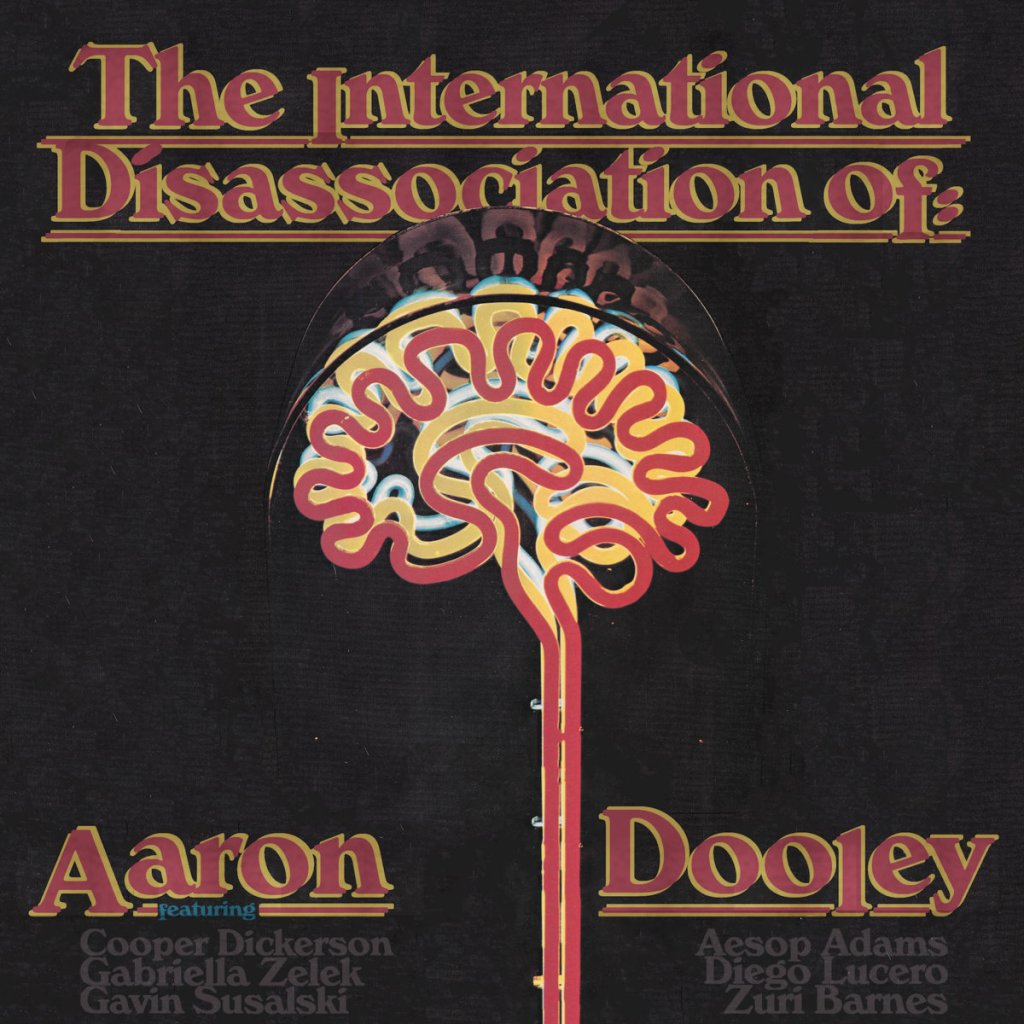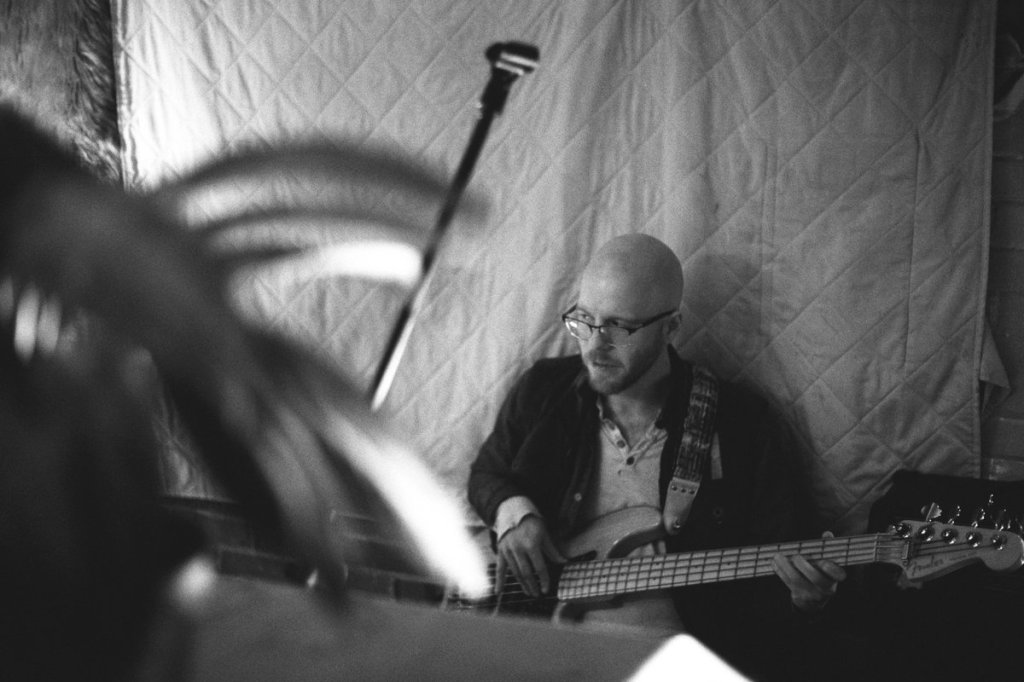
As I slipped into my personal rabbit hole the past months, I found myself feeling more and more attracted to free jazz in all its unfathomable forms and appearances. Take this wonderful new album by Denver’s Aaron Dooley and his International Disassociation: it is mindbogglingly intricate, yet soothing, and danceable all at the same time. It is an album you can take a good while to fully wrap your head around, and it will still show you new angles from time to time. A great record for people with full heads like mine. We got the please to talk to Aaron, who introduced his band and his plans for the future…

Hi Aaron! How are you doing? Can you give us a peek into your life as a musician?
Hey! I’m pretty tired to be honest, but my spirits are high! I just got back home from a two week tour promoting the new album. It has been quite the experience. Went to some great places, met some amazing people. Meeting people is the best part. I’m pretty sure it was my mom who told me this back when I first started playing music, but success as a musician is all about who you know, so I’ve always done my best not to be a stranger, especially since moving to Denver.
Can you introduce your band? How did you get together?
Yes, there are quite a few people on the album to introduce. I suppose I should start with Aesop Adams on guitar. I’ve known him since I was 16, and we’ve played together for most of that time. We also play in a cool rock band called Totem Pocket. Then there’s Zuri Lee on vox and violin, who I met in music school. She’s always been a supporter of the pulled-out stuff we like to play, and we love her for it. Next I met #1 drummer Diego Lucero shortly after rooting into the Denver music scene. We’ve played in a number of bands together including a neo-soul group called Dog Tags. That’s how I met trumpeter Gavin Susalski. It’s good having him in the neighborhood. Cooper Dickerson on the pedal steel is also a friend from music school. A true gnar dawg on steelies and 6-strings, he just moved to Nashville. And finally, we have supreme saxophonist Gabriella Zelek who I met via Denver’s music scene. She just moved to Paris to continue her ascension to the top and we truly miss her.
Also, there’s Eric Welty-Rodriguez, who joined me, Aesop, and Gavin on tour as the drummer. He’s a true powerhouse of musical energy, and his spirit helped drive us forward during our weeks on the road.
Where do you live and what is the music scene like there?
Denver, Colorado, Queen City on the plains. Or so I’ve heard. To be honest, the music scene feels pretty small here. It feels like everyone somehow knows everybody else out here, no matter what genre they play. I’d be a fool to say there’s a lack of outsider and/or progressive music in the city, but the love and attention for it seems few and far between. Denver is also a bit far from other major US cities, so it seems that if touring artists aren’t at the level of playing Red Rocks or one of the major venues in Denver, we usually get skipped. Bummer!
What is your musical background? How did you become such a good player?
Aw shucks, you’re making me blush. Really tho, I appreciate it. I like to think I’m pretty decent on the bass. Yes, there’s cats out there that can probably smoke me in a bass-off, but I’ll say this: I’ve got my own style and I try to sound like myself when I play. Since I started playing when I was 14, I always wanted to do the bass justice. I’ve never seen it as a lesser instrument. It’s like playing drums with strings; a conduit between rhythm and melody. A musical harmony that is not purely tonal.
I’ve gotta give credit to my first bass teacher, Brandon Mooberry. A true master of the bass, he taught me how to be disciplined in my approach to learning bass, and gave me the knowledge I needed to be an expressive player. He somehow knew exactly the right dosage and grade of music theory to teach a stony teenage me how to be creative and jam with people, and I’ve not stopped since.
What is your opinion of the freejazz tag? Would you consider yourself a jazz artist and why/why not?
I guess you could say I’m a supporter of free jazz, free rock, and free musical expression in general. It’s certainly a Rorschachian approach, open to heavy interpretation, and while some interpretations of musical splatting are more appealing than others, it is the best method for traveling wormholes into musical dimensions you hadn’t imagined.
I hesitate to call myself a jazz artist, as I embrace the textures of jazz more than the techniques, but it has always been the genre I am most curious about, which inevitably has tinged my sound.
When do you consider a piece of music yours? Do you consider that question when composing?
It’s hard to say. The music I record is so heavily based in improvisational collaboration, I hesitate to take credit for it as my own. The songs start as bass lines and parts that I come up with, but aside from explaining to the other players what key and dynamics/feel to use, it’s pretty open to interpretation. I guess it’s somewhat of a jazz bandleader approach wherein I assemble the players for the secession, presenting to them the musical roadmap upon which we will improvise, and letting expression take its course. For instance, the song “Jamais Vu” began as a bass line and a loose, swing-like drum beat from me, but the way Diego expanded the beat, and the fantastic melody Gabi created on the spot is entirely of their doing. I am but a catalyst for inspiration.
What role does improv or jamming play in your life?
Shit, I guess a pretty big one. I’ve always liked improvising and spontaneously creating with others and I guess that comes through in my music. In most every project I’ve played in, I make room for improvisation. Improvisations are like sparks that can ignite the vapors of inspiration into a full blown compositions, but even those compositions still need to leave a little room for chance.
What is the highlight of your career so far?
Releasing this album is certainly a highlight. I’ve always dreamed of releasing an LP, and I couldn’t be more grateful to Centripetal Force for making that dream come true. And I can’t express how grateful I am for how much love Trapped In Purgatory received last year. I’m incredibly grateful that Island House put it in people’s ears. Landing a 4-star review in MOJO Magazine? Ecstatic.
What are you looking forward to most this year (or the next)?
More music. Especially after this tour, I’m feeling inspired, looking forward to new possibilities. I’m really hoping to get back into the studio and lay down some new material with The Disassociation. Totem Pocket is working with David Baker, formerly of Mercury Rev, on our next album. It’s sounding really nice. The state of independent music is in constant turmoil, but I am hopeful for myself and my contemporaries.
What should the Weirdo Shrine readers do immediately after reading this interview?
Go buy the album! It’s flippin great, dammit! Centripetal Force still has LPs! Island House still has cassettes! Don’t be denied! Oh, and give me a follow on Instagram and whatever remains of bandcamp and the site formerly known as twitter. I’ll keep you in the loop. And if you’re into cool, noisy rock music, go show Totem Pocket some love as well.
And be well. And do good to one another.








